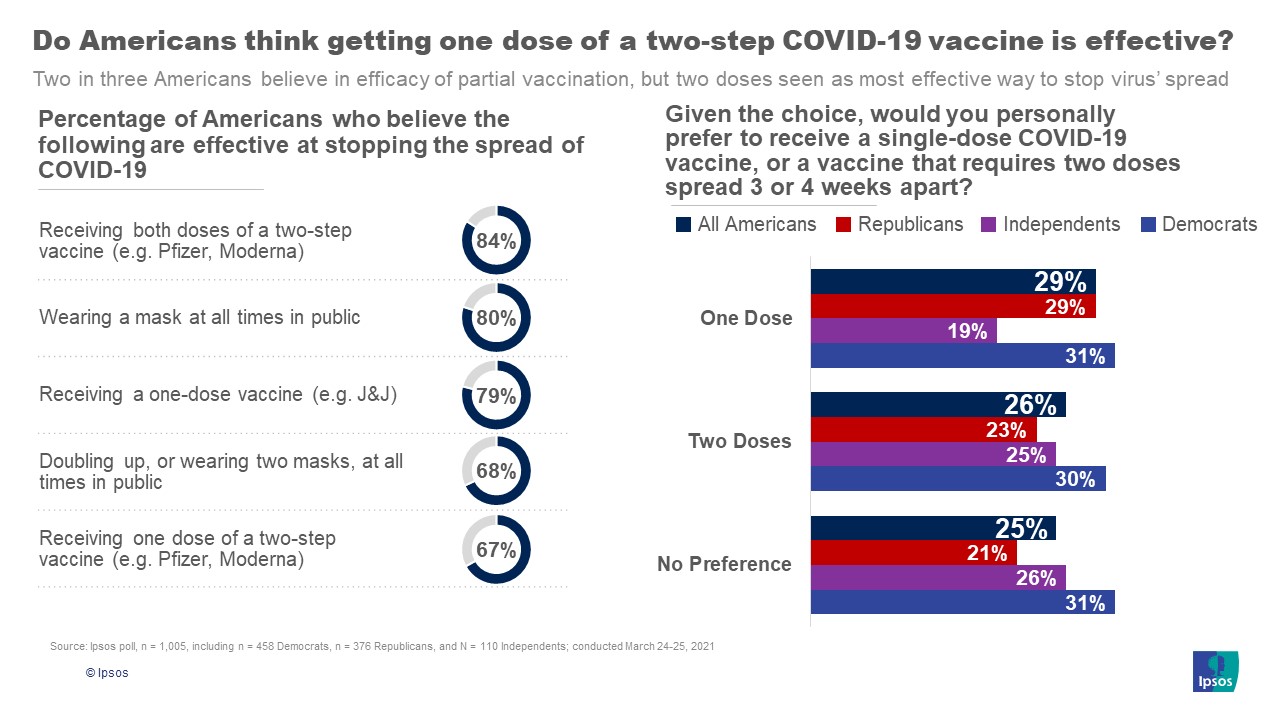Do Americans think getting one dose of a two-step COVID-19 vaccine is effective?
Washington, DC, April 1, 2021 — A recent Ipsos poll shows that while a plurality of Americans prefer a one-dose vaccine, a two-dose vaccine is seen as the most effective way to stop the spread of COVID-19. More than eight in ten Americans believe receiving both doses of a vaccine is effective at stopping the spread of the virus. In addition, most Americans believe in the effectiveness of wearing a mask in public at all times to help stop the spread of the virus.

About the Study
These are some of the findings of an Ipsos poll conducted between March 24-25, 2021. For this survey, a sample of 1,005 adults age 18+ from the continental U.S., Alaska, and Hawaii was interviewed online in English. The sample includes 458 Democrats, 376 Republicans, and 110 Independents.
The sample was randomly drawn from Ipsos’ online panel, partner online panel sources, and “river” sampling and does not rely on a population frame in the traditional sense. Ipsos uses fixed sample targets, unique to each study, in drawing a sample. After a sample has been obtained from the Ipsos panel, Ipsos calibrates respondent characteristics to be representative of the U.S. Population using standard procedures such as raking-ratio adjustments. The source of these population targets is U.S. Census 2018 American Community Survey data. The sample drawn for this study reflects fixed sample targets on demographics. Posthoc weights were made to the population characteristics on gender, age, race/ethnicity, region, and education.
Statistical margins of error are not applicable to online non-probability polls. All sample surveys and polls may be subject to other sources of error, including, but not limited to coverage error and measurement error. Where figures do not sum to 100, this is due to the effects of rounding. The precision of Ipsos online polls is measured using a credibility interval. In this case, the poll has a credibility interval of plus or minus 3.5 percentage points for all respondents. Ipsos calculates a design effect (DEFF) for each study based on the variation of the weights, following the formula of Kish (1965). This study had a credibility interval adjusted for design effect of the following (n=1,005, DEFF=1.5, adjusted Confidence Interval=+/-5.0 percentage points).
The poll also has a credibility interval of plus or minus 5.2 percentage points for Democrats, plus or minus 5.8 percentage points for Republicans, and plus or minus 10.7 percentage points for Independents.
For more information on this news release, please contact:
Mallory Newall
Director, U.S., Public Affairs
Ipsos
+1 202 420-2014
[email protected]
Kate Silverstein
Media Relations Specialist, U.S., Public Affairs
Ipsos
+1 718 755-8829
[email protected]
About Ipsos
Ipsos is the world’s third largest Insights and Analytics company, present in 90 markets and employing more than 18,000 people.
Our passionately curious research professionals, analysts and scientists have built unique multi-specialist capabilities that provide true understanding and powerful insights into the actions, opinions and motivations of citizens, consumers, patients, customers or employees. We serve more than 5000 clients across the world with 75 business solutions.
Founded in France in 1975, Ipsos is listed on the Euronext Paris since July 1st, 1999. The company is part of the SBF 120 and the Mid-60 index and is eligible for the Deferred Settlement Service (SRD).
ISIN code FR0000073298, Reuters ISOS.PA, Bloomberg IPS:FP www.ipsos.com


